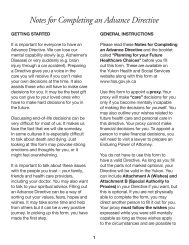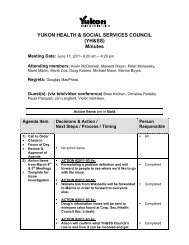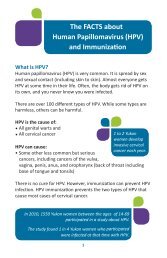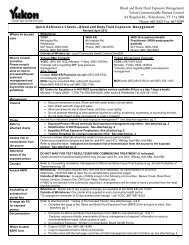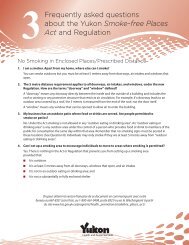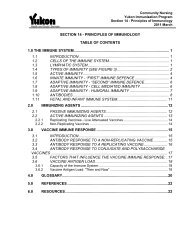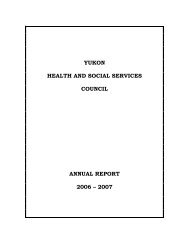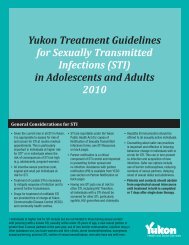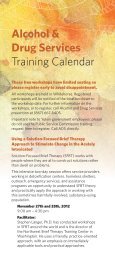West Nile Virus & Yukon
West Nile Virus & Yukon
West Nile Virus & Yukon
Create successful ePaper yourself
Turn your PDF publications into a flip-book with our unique Google optimized e-Paper software.
• For this reason, testing samples of dead corvids for WNV is an effective way of determining<br />
when the virus is active in an area.<br />
If you find A dead bird<br />
You can play an important role in monitoring for WNV by reporting dead birds to your nearest<br />
Environment <strong>Yukon</strong> office. Dead birds may be an indicator that the virus is in an area, but birds<br />
also die from other causes such as starvation, old age or food poisoning.<br />
• Do not pick up the birds unless you are familiar with safety precautions. Please call your<br />
nearest Environment <strong>Yukon</strong> office. Environment <strong>Yukon</strong> Conservation Officers and Regional<br />
Biologists have specific instructions on how to handle dead birds. It is best to assume that<br />
any specimen could be infectious and to take proper precautions at all times.<br />
Personal Prevention Measures<br />
1. Minimize your exposure to mosquitoes:<br />
• When going outdoors, use insect repellents that contain DEET or other approved ingredients.<br />
• Try to avoid spending time outdoors at dawn and at dusk when mosquitoes are most active.<br />
• Wear protective clothing such as long-sleeved shirts, long pants and a hat. Light coloured<br />
clothing is best because mosquitoes tend to be more attracted to dark colours.<br />
• Make sure that door and window screens fit tightly and have no holes that may allow<br />
mosquitoes indoors.<br />
2. Eliminate mosquito breeding sites around your home and cabin:<br />
Mosquitoes lay eggs in standing water and it takes about four days for the eggs to grow into<br />
adults that are ready to fly. Even a small amount of water, for example, in a saucer under a<br />
flowerpot, is enough to act as a breeding ground. Therefore, it is important to eliminate as much<br />
standing water around your property as possible by:<br />
• Regularly draining standing water from items like pool covers, saucers under flowerpots,<br />
recycle bins, garbage cans etc.<br />
• Remove any unused items from around your property including old tires that have a tendency<br />
to collect water.<br />
• Change the water in wading pools, bird baths, pet bowls and livestock watering tanks twice a<br />
week.<br />
• Cover rain barrels with screens.<br />
• Clean out eaves troughs regularly to prevent clogs that can trap water.<br />
• If you have an ornamental pond, consider getting fish that will eat mosquito larvae.<br />
A Word About DEET<br />
The most effective repellents contain DEET (N,N-diethyl-m-toluamide), which is an ingredient<br />
used to repel pests like mosquitoes and ticks. DEET has been tested against a variety of biting<br />
insects and has been very effective. The more DEET a repellent contains the longer time it can<br />
protect you from mosquito bites. A higher percentage of DEET in a repellent does not mean that<br />
your protection is better—just that it will last longer. DEET concentrations higher than 50% do<br />
not increase the length of protection.


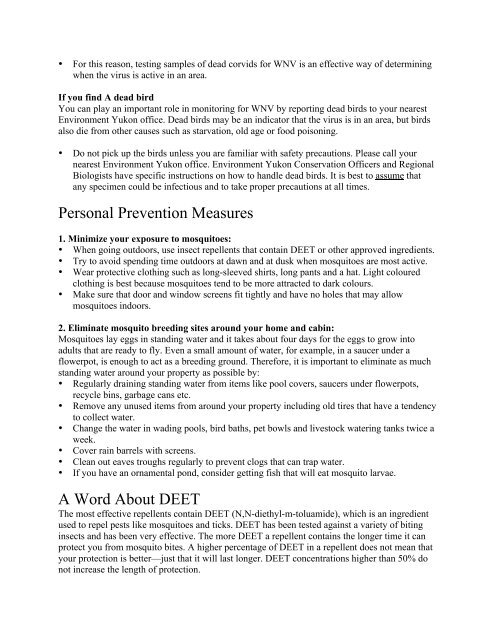

![Women and Alcohol: A women's health resource [2326.26 KB ]](https://img.yumpu.com/22340649/1/190x245/women-and-alcohol-a-womens-health-resource-232626-kb-.jpg?quality=85)
